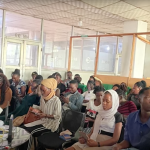Training of agribusiness women entrepreneurs kicks off in Kampala
The training sessions for the first group of entrepreneurs in agribusiness has kicked off following the successful launch of the Business Accelerator Program.
Business Accelerator Program, a brainchild of the Agribusiness Development Centre (ADC) powered by dfcu limited and Rabo foundation will help Agribusinesses to get out of the ideation phase and offer them a business acceleration opportunity.
Ruth Asasira, the manager women in of Business and special programs said the program is aimed at supporting and empowering entrepreneurs in the Agri-business in the country. The business Acceleration Program (BAP) targeted for women-led agribusinesses will build their capacity and investment readiness to access financing from investors and financial institutions.
“We are working to ensure sustainability in the agribusiness space. Look for and address challenges affecting women in business. This cohort is aimed at reaching out to enterprises led and owned by women in the agribusiness space. The Agribusiness, we mean the whole value chain from production, processing, marketing, supply chain, export and others,” she said “We shall help the participants understand the basic management of agribusiness, the risks involved and mobiles capital and financing and market linkages for them. We are looking at empowering entrepreneurs and their agri-businesses; create an enabling environment that can facilitate financing for their businesses and other practices like good governance that can influence the growth of their businesses,” she said
William Sekabembe, the Bank’s Chief Commercial Officer said, “dfcu has made investments in capacity building programs that are customized to address the unique challenges commonly faced by women entrepreneurs. We have also created opportunities and access to funding.”
Since the inception of the Women in Business Program has registered over 80,000 women and positively impacted over 30,000 more. When dfcu Rabo Bank set up the Agribusiness Development Center, our goal was to create self-sufficiency.
The program will enable 350 agribusinesses to become self-sufficient and create at least 350 new jobs, Link at least 50 percent of these agribusinesses to affordable Green Financing, technical assistance and markets.
She said for the next two years, the programs will be held under the themes which include; key value chains; greening agribusinesses; Oil and Gas opportunities for Agribusinesses; Youth in agribusiness with the first cohort premised on a theme of gender inclusivity in agribusiness development.
Over 30 women-owned agribusinesses Begin Skills-Training
Following the successful launch of the Business Accelerator Program (BAP), dfcu Bank and the Agribusiness Development Center (ADC) have officially this morning kicked off training of the first cohort of the Program’s successful business owners.
Attended by over 30 Women-owned agribusinesses, the event was officiated by William Sekabembe, dfcu Bank’s Executive Director and Chief Commercial Officer.
A brainchild of The Agribusiness Development Centre powered by dfcu limited and Rabo Foundation, the Business Accelerator Program is a 4-month program focused on the growth of agribusiness enterprises that have moved from the ideation stage and are ready for scale.
The program seeks to enable 350 agribusinesses (40% women-led) to become self-sufficient & create at least 350 new jobs in the following categories: Agro Marketing, Processing, Production; Agro Forestry; Agro Tourism and Agri- support services like Agritech; Veterinary; Input supply; Extension Service.
The training, which shall run for 4 months starting today (11th October 2022), will utilise a visual modelling method known as The Business Model Canvas (BMC) – an excellent strategic management thinking tool that helps entrepreneurs in planning and developing new or redesigning existing business models – to build competitive business models.
At the end of the 4 months, the participants shall have acquired among others, the skills & tools to support in Business strategic positioning & Business model validation, Branding, Accounting and Tax Advisory as well as Linkages to affordable financial services.
Addressing the participants, dfcu Bank Executive Director and Chief Commercial Officer William Sekabembe noted that Business Acceleration Program (BAP) will build the capacity and investment readiness of its beneficiaries, enabling them to access financing from investors and financial institutions.
“Literature shows that women in Uganda make up to 52% of the labour force and are an important talent to help Uganda meet its development goals, especially in entrepreneurship and micro, small and medium enterprises growth. However, it is generally known that women face more challenges than men in starting, managing, and growing their enterprises as they are more likely to be impeded by a lack of the necessary capacities, skills, and resources. To this end, dfcu has worked closely with ADC to create a Business Accelerator Program whose main objective is to support businesses like yours to improve and attract the necessary market and financial linkages for growth and sustainability,” he said.

“Since its inception, dfcu Bank has made continuous commitments to support a wide base of customers that include SMEs, women entrepreneurs, Investment Clubs. The Bank’s Women in Business Program proposition which among others, serves women employed in agribusiness as a key focus area has registered over 80,000 clients with over 25,000 of them benefiting from the capacity building sessions and over 6,000 women accessing financing through the dfcu WiB loans,” Sekabembe added.
The Business Accelerator Program alumni will also benefit from the dfcu Bank Small and Medium enterprise (SME) agribusiness value proposition which includes affordable transactional banking, financing as well as other capacity building programs.
Coffee farmers undergo Price Risk Management training
In response to the demands of farmers and exporters of coffee and cocoa, the Agribusiness Business Development Centre (ADC) and SEATINI have just finished two days of training on price risk management. ADC hosted 40 representatives of farm-based organizations from various parts of the East, West, and Central regions. The training focused on the market fundamentals of demand and supply.
The participants of the training had a chance to get an in-depth market analysis from the ADC business advisors, who emphasized the need for traders to always give updates on the ground with respect to logistics management to earn the trust of their contractors.

Roland Ainebyona, ADC Business Advisor (West)
Roland Ainebyona Rwambuka business advisor ADC,” The farmers are exposed to a number of risks both internal and external. This training is to enhance their capacity to come up with strategies and tools to use to mitigate the risks to improve their efficiency. There is no business without risk therefore the role of the farmers is to be well prepared to mitigate these risks. The world coffee production for 2022/23 is forecast to rebound by 7.8 million bags from the previous year to 175 million, due primarily to Brazil’s Arabica crop entering the on-year of the biennial production cycle.
Brendah Akankunda from SEATINI, who is the main partner during this PRM training, says, “Their main concern is to make sure there are fair prices for the farmers, there are no violations of rights along the value chains, but importantly to encourage value addition because Uganda has been trapped at the lower end of the chain.”
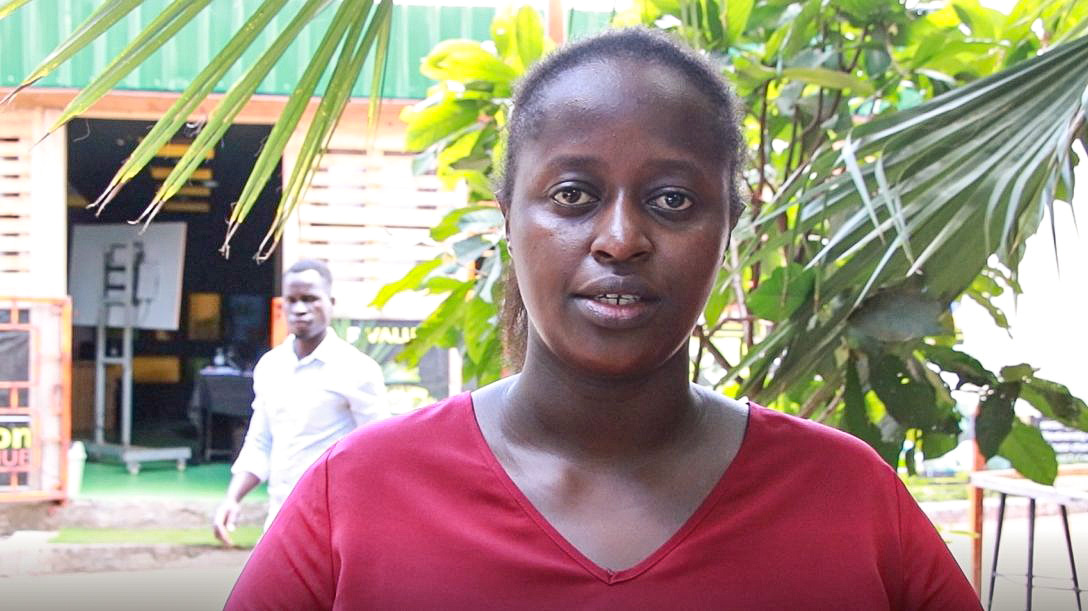
Brendah Akankunda from SEATINI
Throughout our various engagements with stakeholders, we have seen the need for capacity building and this training is addressing that” The main objective of ADC’s work is to make agribusiness self-sufficient and profitable.
Nassaga Investment Ltd.’s Wataaka Charles tells the story of how their coffee was rated as the best but was not being sold on the global market.
“For me, I am a typical farmer which means I understand things at a local level, and yet as a leader of the organization, I need to be getting market for the coffees that we are producing. We were operating like an island but during the first training of the ADC, opened my eyes to how to negotiate for international markets and learnt how to coordinate and network with other coffee producers, in fact from the training in March, we got a buyer who desired to buy our coffee and we were to negotiate and understand the incoterms that secured us a good deal.” I appeal to the ADC and SEATINI with other stakeholders to expand this training to our regions.
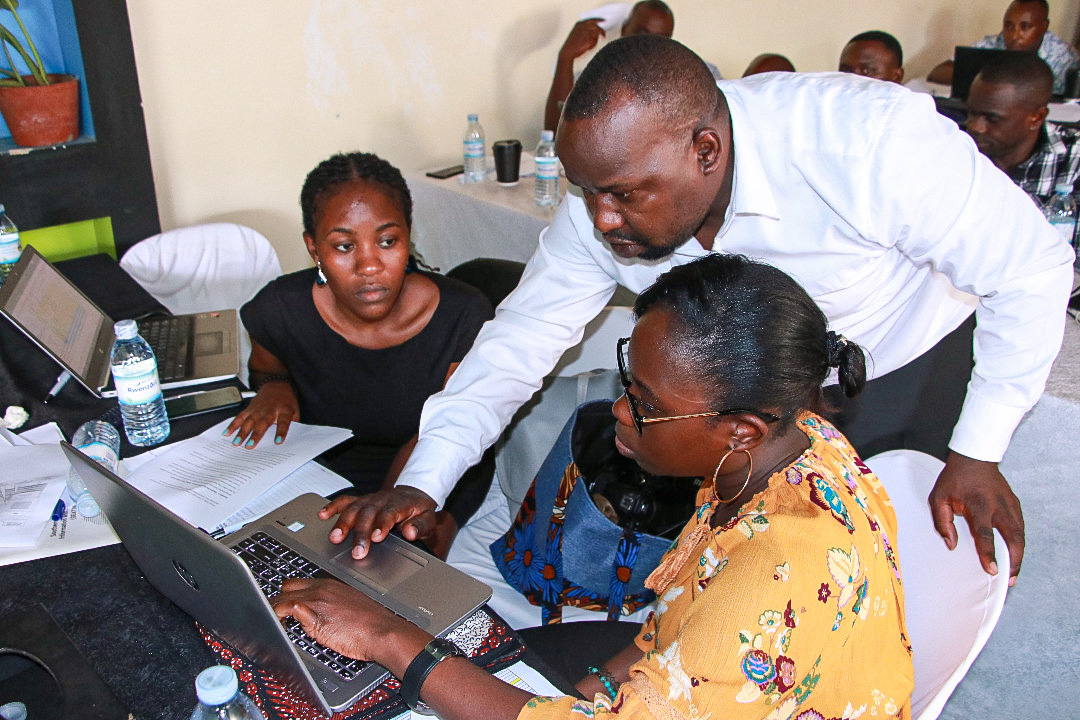
Wilber Kayonga, ADC Business Advisor (West-Albertine Region)
36 Agribusiness Entrepreneurs Graduate With Crucial Skills From ADC’s Business Accelerator Program
At a momentous event held on Friday, 36 Agribusiness entrepreneurs celebrated their graduation from the 2nd and 3rd cohorts of the Business Accelerator Program (BAP). This transformational program, implemented by Agribusiness Development Centre (ADC) in collaboration with GOPA Worldwide Consultants and powered by dfcu Limited and Rabo Foundation, aimed to equip participants with essential business skills and mentorship to drive investor attractiveness, optimize operations, enhance marketing, and seize networking opportunities.
Launched in February 2023, the 2nd and 3rd cohorts of the Business Accelerator Program saw active participation from 110 participants representing 59 enterprises. Throughout the intensive training and mentorship sessions, the program focused on propelling agribusinesses from ideation phase to sustainable growth, ultimately attracting markets and funding for their operations.
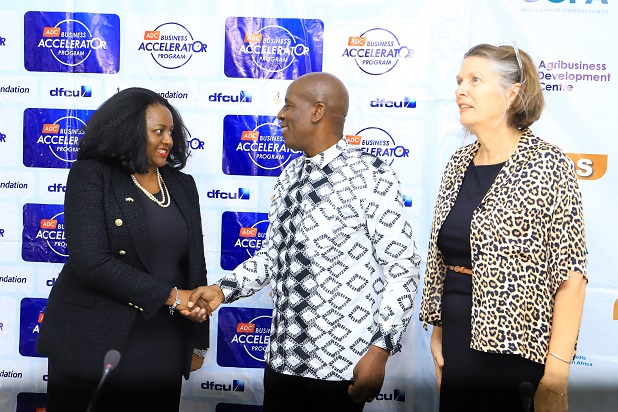
ADC, in partnership with dfcu Limited and Rabo Foundation, initiated the Business Accelerator Program in 2018, seeking to support agribusinesses in unlocking their full potential and fostering growth and sustainability. The recent graduation ceremony at dfcu Bank’s Head Offices in Nakasero marked a significant milestone in the entrepreneurs’ journey towards success.
Addressing the graduates as the guest of Honor, Geraldine Ssali Busuulwa, the Permanent Secretary of Uganda Ministry of Trade, Industry, and Cooperatives, emphasized the importance of returning to the cooperative model to facilitate mass production. She encouraged investment in decontamination technology and improved packaging for agricultural products, while stressing the need for affordable credit access to ensure sustainable growth for farmers.
Ms. Josephine Mukumbya, the Executive Director of ADC, expressed her gratitude to all stakeholders, including GIZ, GOPA Worldwide Consultants, ECOS (funded by GIZ), and dfcu Bank, for their invaluable partnership and unwavering support in empowering agribusinesses to achieve their growth objectives.
Speaking at the award event, Charles Mudiwa, CEO of dfcu Bank, underscored the significance of investing in agribusiness to secure food supply for humanity. He encouraged entrepreneurs to think of large-scale production and emphasized the need to find markets for their products.
Mudiwa also challenged the entrepreneurs on the issue of finding markets. He mentioned that in addition to financing agricultural projects, dfcu has recently announced a partnership with Rabo Bank and Master Card to create a platform for agribusiness entrepreneurs to have access to markets for their products. Mudiwa also highlighted dfcu‘s recent partnership with Rabo Bank and Mastercard, which will create a platform for agribusiness entrepreneurs to access markets and further their growth. He said, “It is important to invest in Agribusiness because food supply is very important for the existence of humanity.”
He further highlighted that it is important for farmers to think of large-scale production saying, “It is good to start small, but we have to grow and become big producers.”
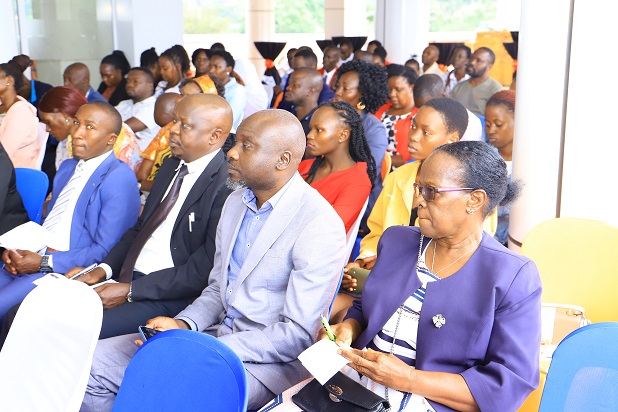
Karim Boven, the ADC patron, and Ambassador of the Kingdom of Netherlands commended the pivotal role of farming in wealth creation and propelling Uganda’s economy to new heights. dfcu Bank has a long history of supporting the agricultural sector as evidenced by its diverse initiatives, such as Harvest Money, Best Farmers Awards, and patronage of the Agribusiness Development Centre. The Bank has forged strategic partnerships with Mastercard, Rabo Partnerships, the Royal Dutch Embassy, Aceli Africa and GOPA – to drive skilling of its staff as well as various players in the agribusiness value chain.
Through these initiatives and partnerships, dfcu Bank continues to pave the way for a sustainable and prosperous future for Uganda’s agricultural landscape.
Kyeitagi Dairy West C
“We had no functional committees and the existing ones that did not know their roles. Now because of the trainings, we have reinstated our committees and roles and responsibilities clearly defined. They are more active in helping the cooperative source for funding and markets.”
Kyeitagi Dairy Farmers
“Initially, we had stopped accepting new membership; out of our own ignorance and fear of new peoples’ characters. Our income level remained the same. As a result of learning about open and voluntary membership, we increased from 45-67, our incomes have increased as well from UGX25-45 million”
Jimmy Bagonza – General Manager, RFCU
“Some of our primary cooperative societies have taken up the development and utilization of Gender Sensitive policies. More women have been engaged in management and leadership positions”



